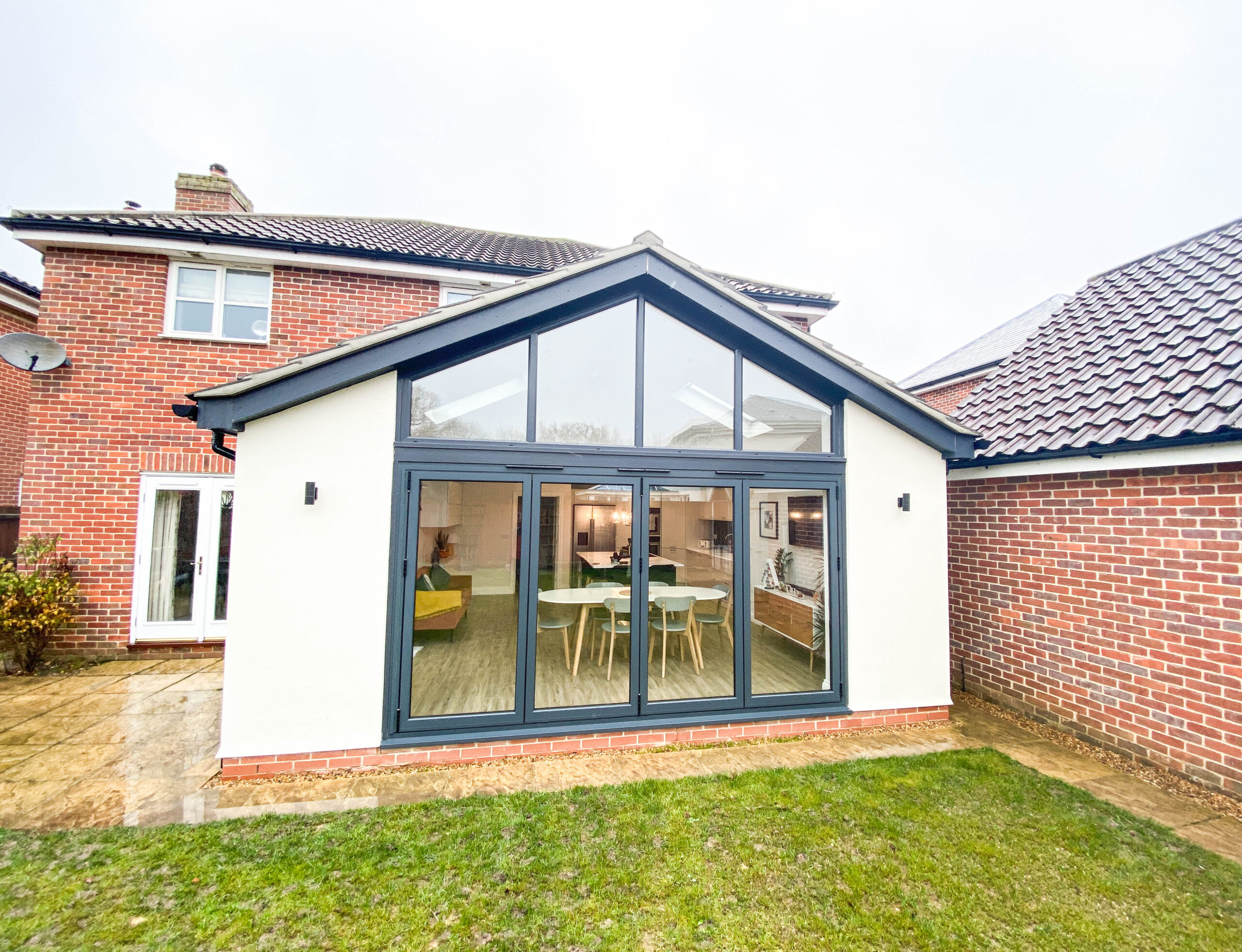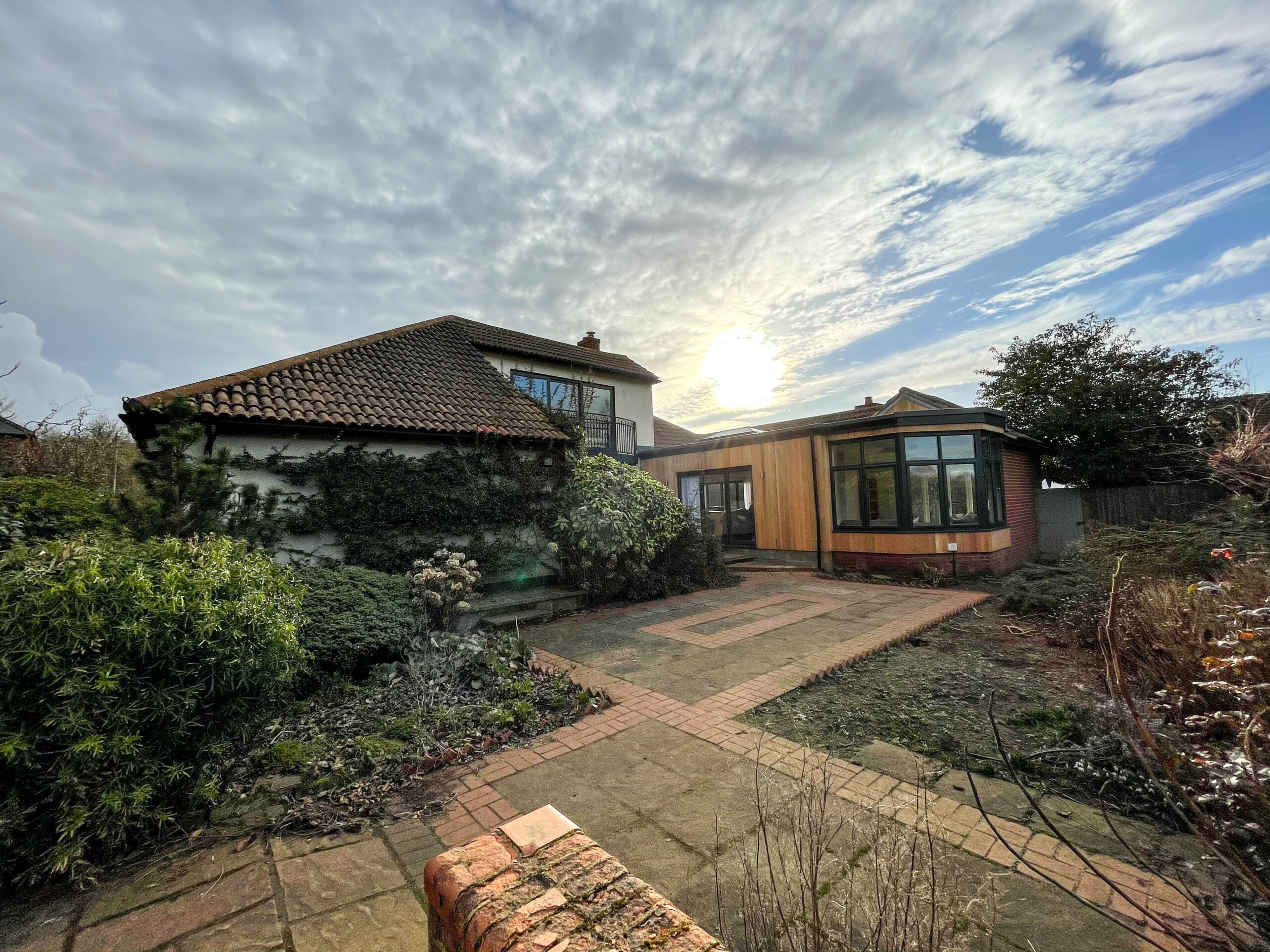
House Extensions 101: From Idea to Reality
If you’re thinking about house extensions and the idea of potentially enlarging your home with this construction method, then this is the complete guide for you. Our team of property extension experts have poured everything they know about this home improvement method into this one article, offering you a handy resource to better understand house extensions.
In this essential house extensions guide, we will cover every aspect of this home construction process, including, but not limited to:
- Types of house extensions
- The costs involved
- House extension design and architecture
- House extension planning permission
- Building an extension
- House extensions ideas

Why build an extension onto your property? The main reason people turn to house extensions is to enlarge their homes, creating a more spacious house that can benefit from the addition of more rooms or a new home layout. Furthermore, adding an extension to your property can increase the value of a home along with a whole host of other benefits.
After discovering how beneficial a house extension can be, homeowners next want to learn how to create one for themselves. For a complete rundown of everything involved in the process of designing and building a house extension, we invite you to read through this guide. When you’ve done that, it will be time to reach out to a local construction company to get your project started.
Why Listen to Bespoke Norfolk Group?
Bespoke Norfolk Group is a high-end construction company in Norfolk that is dedicated to creating incredible living spaces. We are on a mission to transform Norfolk through our tailored home construction services, which include building custom homes from scratch, remodelling home interiors, converting unused spaces into luxury living areas, and expertly enlarging homes with high-quality house extensions.

As seasoned house extension builders, we know what it takes to plan, design and build an extension – the overall process, key stages in the project, and more. Plus, we’re well-placed to offer homebuyers industry insights and invaluable advice, such as the financial side of things and what to expect during the build, as they consider this incredible home improvement method.
We’re keen to get started and share with you everything we know about house extensions, and we hope you’re ready to discover what house extensions are, why you should extend your home, and how.
House Extension Types
The first thing to know is that there are multiple house extension types to choose from. This makes a house extension one of the most versatile home improvement methods, providing solutions for homes of all shapes and sizes.
Single-Storey House Extensions

A single-storey house extension or one-storey house extension consists of just one storey or floor and is built onto the ground floor of a property. Many utilise this form of extension to slightly enlarge the floor plan of their homes. With this, homeowners can enlarge their kitchens to create a larger kitchen and dining area, add an extra room to their property, or slightly alter the layout of their home.
Double-Storey House Extensions

Alternatively, double-storey house extensions or two-storey house extensions have two storeys/floors. Typically, a double-storey extension provides more space than a single-storey. These types of extensions are usually used to add 1-2 extra rooms to a home, which can have a huge impact on the value of a property.
Which is best? Read our blog ‘Should I Build a Single or Double-Storey Extension’ to find out.
Timber Frame House Extensions
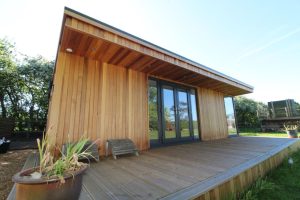
The following extension types can be constructed as a single- or double-storey structure, including this next house extension type – timber frame. This property extension is built using timber as opposed to brick and mortar. There are plenty of advantages to timber frame extensions including sustainability and quick build times.
Timber frame construction, as a whole, is an exciting area of construction and worth exploring if you’re thinking of extending your home.
Side Extensions

A side house extension is built onto the side of a property to enlarge the space lengthways. If a home doesn’t have much space to extend at the front or back, then a side extension could be an ideal remedy, especially when considering most homes have some (even if it’s just a little) unused space at the side(s).
Front House Extensions

Did you know that you can extend the front of a property? This can be a great way of enlarging a home if a homeowner doesn’t want to sacrifice any of the space in their back garden. A front house extension can be as small as a cosy porch or used to create an entirely new dynamic to your home.
Rear House Extensions

One of the most common extension types is rear extensions. These work by using up space at the back of the property to extend the rear part of a home. While this extension type will lead to a smaller back garden, most homes have plenty of space to work with at the rear, enabling homeowners plenty of options when it comes time to extend the home.
Wraparound Extensions
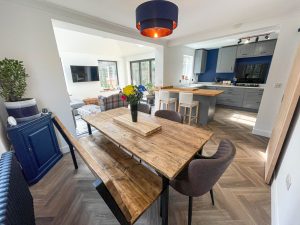
This final extension type is a combination of a side and rear extension to create a structure that wraps around the original dwelling. This is perfect for homes that have space at the side and rear and lends itself well to creating a more open-plan home layout.
House Extensions Costs
The financial aspect of a home construction project is always important and a house extension is no different. Before considering an extension, a homeowner will first want to know how much this is going to cost. A house extension can easily be one of the priciest purchases a person ever makes, so it’s vital to get right.

With that being said, it’s difficult to give people a set price of how much an extension will be straight away as so many factors affect this, such as:
- The type of extension
- How big it will be
- The difficulty of the build
- The design of the extension
- Where you are located
- The materials needed
- Contractor pricing
- And more

However, to help provide some clarity on how much a house extension may cost, below are some estimated price ranges based on house extension type:
- Single-storey house extension – £40,000 to £140,000
- Double-storey house extension – £65,000 to £150,000
How Much Value Does an Extension Add to a Property?
As we mentioned at the beginning of this blog, a house extension will usually add extra value to a home. By saying this, we mean that by adding an extension onto a property, a homeowner can increase the monetary value of their home.
This may not be important to you if you have no immediate plans to sell your property, but it can be helpful to view your house extension as an investment opportunity should you decide to sell further down the road. This may also make the house renovation cost easier to stomach. Professional home renovators may also use extensions as a way of making a profit on a property purchase, such as extending and renovating an older property to sell it as a renewed modern paradise.

Regarding how much value you can expect to add to a property via a house extension, it’s similar to pricing an extension project – it’s impossible to pinpoint a guaranteed figure. Yet, we can answer this with an estimation of how much value a house extension can provide by house extension type.
- Single-storey house extension – 5% to 8% added value
- Double-storey house extension – 10% to 20% added value
Why Value is Added
How much-added value a property receives as a result of a home extension is dependent on many things. The main thing is how a property has been improved with the extension. For example, suppose a home has a large double-storey extension added to it that introduces an extra bedroom, extra bathroom, and extra living room space. In that case, you can likely expect to receive the higher end of value added, likely around 20%.
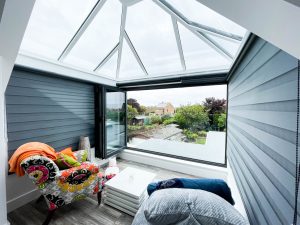
Whereas, if a home has increased its size only slightly to provide more kitchen space via a small single-storey extension, you may not see as much value added, say maybe 5%.
Another big factor to consider is the quality of the build. A house extension will only provide added value if it has been built to a good standard. Poorly built extensions that have been constructed by unreliable contractors will not add value to a property. In some cases, such a project could lessen the value of a home. This is why it’s best to work with a professional construction company that can show their quality with past projects.
Ways to Save Money on a House Extension
While house extensions are a big financial commitment, there are ways you can save money on the overall cost. Here are some solutions:
- Proper budgeting – Instead of coming up with a figure of how much you can spend, take your budget more seriously by assigning a percentage of your budget to any surprises that may arise; come up with a worst-case-scenario figure – this is the absolute maximum cost you could cover; create a spreadsheet to track expenses.
- DIY where you can – You can save a serious amount of cash by completing some of the tasks in your house extension project yourself. Such tasks include painting and decorating, installing easy fixtures (e.g. shelves), and tiling.
- Ask the right questions – This suggestion saves both time and money. When looking at different house extension contractors to work with, ask the right questions to gauge whether these people are right for the job. If you’re spending this large amount of money, you need to be confident in your chosen contractors from the very beginning.
- Shop around – Different house extension contractors will charge differently based on such things as their ability, experience, processes, specialities, and so on. By shopping around you can compare prices and hopefully begin to understand what estimations are reasonable and what are not.
- Design and build with one company – Instead of juggling multiple different contractors and invoices (builders, architects, etc), choose one company to design and build with. This way, everything (house extension plans, design and construction) is all included in one set price.
House Extension Architect
Is a house extension architect required? First of all, you are not required by law to hire an architect for your extension. While they may not be a legal requirement and are believed to be better suited to larger projects, like a new build, an architect can contribute to the success of your house extension in so many ways.

At Bespoke Norfolk Group, we also offer architectural design services as part of our design and build package.
House Extension Design
The planning phase of a house extension project is a vital one and architectural design is a big part of it. This is the very start of your house extension project and will set the course for the coming weeks or months as your extension comes together.
An architect can assist you by offering house extension drawings and other assets, including:
- Preliminary drawings – These are the initial house extension plans.
- Working drawings – More detailed drawings for the house extension builder to work from.
- Structural engineer design calculations – Designs and calculations to ensure structural integrity.
- Help with building control approval – Ensuring designs are compliant with building regulations

Having an architect on your side to help with the design of your house extension is an invaluable asset. By utilising their expertise in design prowess, your project will benefit from a better design, which leads to more added value for your home, plus (should you need it) planning permission is easier to get approved. That leads us nicely to the next part of this guide.
House Extensions Planning Permission
If you’re hoping to build something like a new home, you will need planning permission. And if you’re making a major change to an existing property – like renovating the whole home – you will likely need planning permission.
Essentially, planning permission is asking permission from your Local Planning Authority – which is likely the planning department of your local council – to carry out a certain construction project. After submitting your planning application, permission will either be approved or denied.

What about house extensions planning permission? When it comes to extensions, you may not need planning permission and could build your extension under permitted development rights.
What Are Permitted Development Rights?
This is a scheme that was introduced by the government to allow homeowners to make improvements/alterations to their property without having to seek planning permission. For a construction project to fall under permitted development rights, each type of project must adhere to certain rules and guidelines. If you cannot meet these criteria, full planning permission will be needed.
See below for the rules and guidelines of permitted development rights for both single- and double-storey house extensions.
Single-Storey Extension Permitted Development Rights
You can create a side, front or rear extension onto your property if:
- You use similar materials to the existing dwelling
- Your extension takes up less than 50% of the land around the existing dwelling
- The extension is less than 4m in height
- Its eaves and ridges are not taller than the existing dwelling
- Rear extensions must not extend beyond the rear wall of the existing dwelling by 3m for an attached house or 4m for a detached house
- Side extensions must take up less than 50% of the width of the existing dwelling
- Front or side extensions must not front a highway
Double-Storey Extension Permitted Development Rights
You can build a two-storey house extension under permitted development rights if:
- You use similar materials to the existing dwelling
- Your extension takes up less than 50% of the land around the existing dwelling
- Your extension must take up less than 50% of the width of the existing dwelling
- Its eaves and ridges are not taller than the existing dwelling
- The existing dwelling is not a single-storey home
- Terraces must be no more than 3.5m higher than the next tallest terrace
Permitted Development Rights Restrictions
Permitted development rights can be a great advantage to homeowners hoping to extend their homes without seeking planning permission. As you can see from the above criteria, it is easier to build smaller single-storey house extensions under permitted development rights than it is to build larger double-storey extensions.

As long as you work with a trusted, reliable and experienced house extension contractor, passing planning permission isn’t as difficult as it is perceived to be, and can mean you are not limited by permitted development guidelines when building your dream house extension.
It’s also important to know that there will be some cases where permitted development rights will not be allowed. These are as follows:
- These rights cannot be accessed if the building is a flat
- These rights cannot be accessed if the building is a maisonette
- These rights cannot be accessed if the building is a listed building
- These rights cannot be accessed if a property is located within a conservation area
- These rights cannot be accessed if a property is located within a national park
- These rights cannot be accessed if a property is located within an area of Outstanding Natural Beauty
- These rights cannot be accessed if a property is located within a World Heritage Site
- These rights cannot be accessed if a property is located within the Norfolk or Suffolk Broads
Other Things to Consider When Planning a Property Extension
Alongside planning permission / permitted development rights, here are some other things to consider when planning your house extension project.
- Building regulations
- Party wall matters
- Property surveys
A construction company like Bespoke Norfolk Group could help you to navigate every step to building a house extension. Speak to our team >
Building a House Extension
When it comes down to the physical stage of actually building a house extension, it’s good to be clear on a few things, such as the stages of designing through to building and the kind of timeframe you can expect from a project such as this.

Unless you’re a construction professional, you will likely be handing the responsibility of building the house extension to a local construction company. That doesn’t mean you’re not involved in the process. As the client, you can be as involved as you like. After all, it’s your home that will be turned into a temporary building site during the construction process, so you probably want to understand a few things, like how long this is going to take.
How Long an Extension Takes to Build
Like most of the topics highlighted in this article, how long your extension will take to complete is dependent on several factors. However, we can share the estimated timeframes for the different types of extensions:
- Single-storey house extensions – 2-4 months
- Double-storey house extensions – 9-11 months

As a construction company in Norfolk, there’s nothing more satisfying for our team and clients than seeing the before and after of a house extension, so the time it takes is all worth it!
Project Management
A reputable construction company that knows what they are doing will typically manage a house extension project for you by assigning a project manager. These men and women become responsible for the projects they have been assigned to. Oftentimes, they will act as the integral link between a homeowner and their construction project, keeping them informed at every stage of the build. 
Project managers are also responsible for ensuring a project is on time and on budget, so two of the biggest factors – cost and time – are managed well and don’t exceed what has been agreed. Of course, despite how much planning is done, surprises can still rear their ugly heads and push back on a project’s progress. However, your project manager will be there to resolve any issues and strategise with you and their team.
The Design and Build Process of a House Extension
Every house extension project is indeed unique and while each one is different, each one will follow a similar process, which typically involves:
- Initial meetings – To start, it’s a good idea for you to sit down with shortlisted house extension builders to discuss initial ideas and also to get to know them, hearing how they operate and how they plan on moving forward.
- Estimations – With a clearer idea of what you expect as a result of this project, contractors can offer more accurate estimations so that you can get a better idea of how much your house extension is going to cost.
- House extension drawings – At this stage, a house extension architect will come into play, offering the drawings that will act as the blueprint of your extension. The builders will follow these drawings to construct the extension.
- Submit planning application – Your planning application will be submitted or the local authority notified of construction under permitted development rights
- External construction begins – Armed with the house extension plans, the external structure will be built. This stage consists of laying foundations, constructing a framework, fitting roofing, and more.
- Interior assembly – The necessary interior work, such as insulation, will be completed. Along with the internal fit out, and interior design.
- Final checks – Lastly, a final inspection of the completed house extension. This is an opportunity to address any snags and check the structure complies with safety and building regulations.
House Extensions Ideas
Double-Storey Front Extension in Blakeney, Norfolk
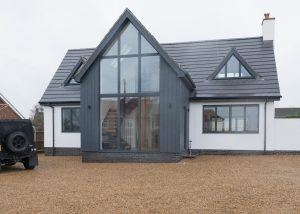
As part of this full home renovation of a bungalow property in Blakeney, Norfolk, we extended the front of this home with a breathtaking double-storey extension. This front-facing house extension completely transformed this property from a dilapidated bungalow to a contemporary castle of luxury.
Kitchen / Diner Extension in Dereham, Norfolk

Many homes face the common issue of suffering from small, cramped and compact kitchens. Fortunately, there is a solution to this nagging problem. By constructing a house extension with the sole purpose of enlarging a kitchen space, you can open up a home and incorporate a brand-new kitchen with its own dining space.
Renovating and Extending a Barn in Sedgeford, Norfolk

Disused and unloved farm buildings have the potential to be turned into incredible homes. As part of this barn renovation project, we also utilised a house extension to make the barn larger and to adopt a more appropriate home layout that was ideal for home life.
House Extensions in Norfolk
If you’re a homeowner in the Norfolk/Cambridgeshire area and would love to improve your home with an extension, Bespoke Norfolk Group can help. We are seasoned, professional, and always-reliable house extension builders, able to provide homeowners with the opportunity to fall back in love with their property.
To schedule a free meeting with our senior team, we invite you to book a consultation via our website by sending us your enquiry. Then, a member of our team will be in touch to discuss your project further.






